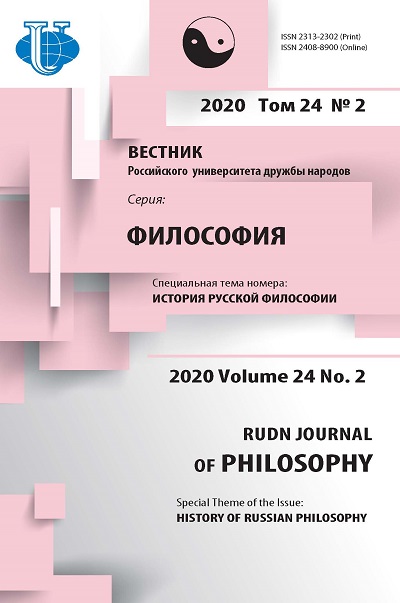Information Warfare Within the Context of Cybernetic Epistemology
- Authors: Bindas D.V.1
-
Affiliations:
- Moscow State Institute of International Relations (MGIMO)
- Issue: Vol 24, No 2 (2020): HISTORY OF RUSSIAN PHILOSOPHY
- Pages: 297-302
- Section: SOCIAL PHILOSOPHY
- URL: https://journals.rudn.ru/philosophy/article/view/23683
- DOI: https://doi.org/10.22363/2313-2302-2020-24-2-297-302
Cite item
Full Text
Abstract
In the present article the author studies and reviews the essential scientific opinions and discourse on the understanding of the term and phenomena of Cybernetics. The article is the author's vision of the concept of cybernetic epistemology based on its progressive methodological features. The main idea of the understanding of the information warfare category as a complex social system (society) in the context of cybernetic epistemology is also developed in the present research. The concept of complexity theory has not yet been applied in the study of ontological characteristics of the "information warfare" phenomenon so far. This kind of analyzing method allows us to highlight the true essential characteristics of "information warfare". There are recursiveness and spontaneous nature among them. This kind of epistemology methods and their possible and proper application in Cybernetics were analyzed and reviewed in the present paper. Such an analyzing confirmed the relevance of this research for the formalization of the world’s complex phenomena. It also determined the possibility of constructive generalization of knowledge and research data. However, this knowledge should be gained in the process of complex formalization of the studied phenomena characteristics (ontology) and the maximum permissible changes and transformation in their conditions and forms.
About the authors
D. V. Bindas
Moscow State Institute of International Relations (MGIMO)
Author for correspondence.
Email: dmitrij.bindas@bk.ru
the applicant at the Department of Philosophy
76, Prospect Vernadskogo, Moscow, Russian Federation, 119454References
- Garrow EE, Hasenfeld Y. The Epistemological Challenges of Social Work Intervention Research. Research on Social Work Practice. 2017; 27 (4): 494-502.
- Shaw EM. Evaluating Knowing and Reasoning in College for Use in Christian Higher Education. Christian Educational Journal. 2019; 16 (2): 344-358.
- Dubois E, McKelvey F. Political bots: Disrupting Canada's democracy. Canadian Journal of Communication. 2019; 44 (2): 27-33.
- Wilf E. Separating noise from signal: The ethnomethodological uncanny as aesthetic pleasure in human-machine interaction in the United States. American Ethnologist. 2019; 46 (2): 202-213.
- Wiener N. Cybernetics or Control and Communication in the Animal and the Machine. New York: The Technology Press and John Wiley & Sons, Inc. Paris: Hermann et Cie, 1948. 223 p.
- Lidov D. Genuine Triadicity in Computation. Cognition and Consciousness. Chinese Semiotic Studies. 2019; 15 (2):175-197.
- Picon A. Cities and information systems: From the birth of modern urbanism to the emergence of the smart city. Flux. 2018; 111-112 (1-2): 80-93.
- Sobolev SL. Osnovnye cherty kibernetiki. SL Sobolev, АI Kitov and АА Lyapunov. Voprosy filosofii. 1955: (4): 136-148. (In Russian).
- Kolmogorov АN. Kibernetika. Bolshaya sovetskaya entsiklopediya. 2 ed. Vol. 51. Moscow; 1957. P. 149-151. (In Russian).
- Butkovskij АG. K metodologii i filosofii kibernetiki. Kratkie tezisy. Moscow; 2010. 80 p. (In Russian).
- Peters MA, Besley T. Critical philosophy of the postdigital. Review of Contemporary Philosophy. 2019; 18: 64-79.
- Chapman J. Living and Loving Cybernetics. World Futures. 2019; 75 (1-2): 92-100.
- Mikeshina LA. Epistemology in Russia: ITS formation in the context of social sciences and the humanities. Epistemology and Philosophy of Science. 2019; 56 (1): 8-22.
- Kondrashov VА. Novejshij filosofskij slovar'. VА Kondrashov, DА Chekalov and VN Koporullina. 3 ed. Moscow; 2008. 672 p. (In Russian).
- Fedorov MV. Kiberneticheskaya ehpistemologiya kak metodologicheskaya paradigma issledovaniya slozhnykh sotsial'nykh system. Istoriya i pedagogika estestvoznaniya. 2016; (1):14-17. (In Russian).
- Slipchenko VI. Vojny shestogo pokoleniya. Oruzhie i voennoe iskusstvo budushhego. Moscow; 2002. P. 153. (In Russian).
- Kapitanets IM. Silnyj flot - silnaya Rossiya. Moscow; 2006. 544 p. (In Russian).
- Máhrik T, Pavlíková M, Root J. Importance of the incarnation in the works of C.S. Lewis and S. Kierkegaard. European Journal of Science and Theology. 2018;14 (2): 43-53.
















